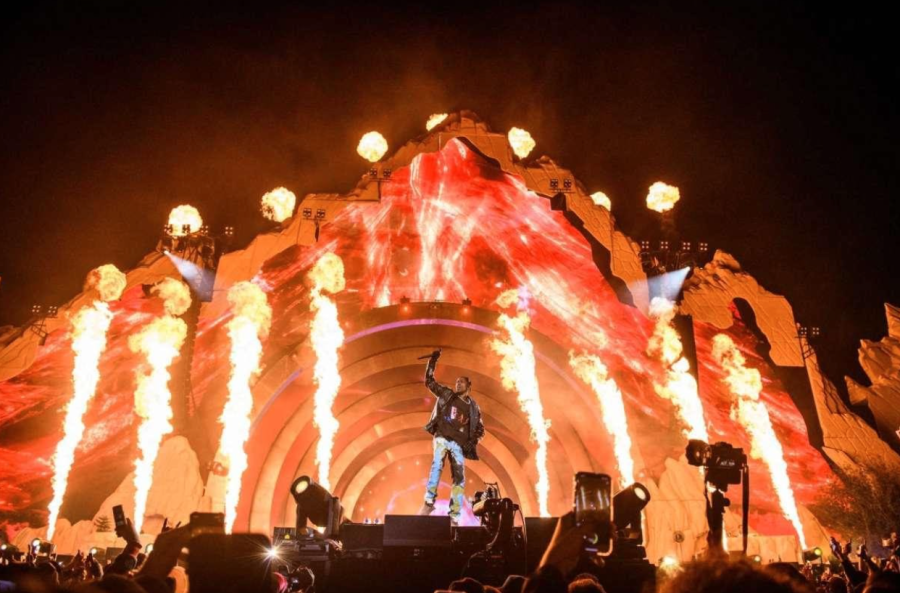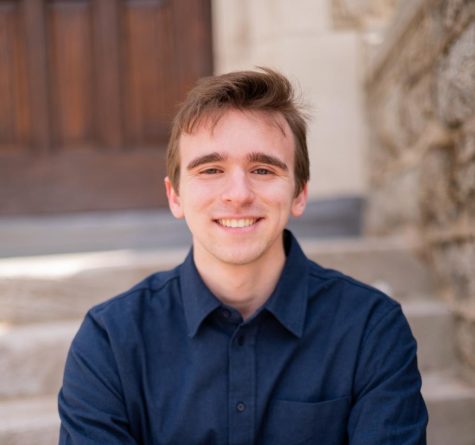The Astroworld Festival Tragedy: Who’s to Blame?
Courtesy of The Houston Chronicle
Travis Scott’s concert on Nov. 5 ended in eight deaths.
November 10, 2021
After a year and a half of COVID-19 restrictions, perhaps the most sorely-missed experience was concerts: a communal gathering centered around the love of music. This fact made it all the more sour when a crowd crush occurred at a concert on Friday, Nov. 5, leaving eight people dead, 25 people hospitalized and more than 300 people injured.
The tragedy happened at the Astroworld Festival, an annual music festival held by rapper Travis Scott at NRG Park in Houston, Texas. The concert was sold out, with about 50,000 people in attendance.
The concert quickly erupted into chaos. People were so tightly-packed together in the audience that many began to pass out or even suffer cardiac arrest. The issue became fatal when people began to fall over and vertically pile on top of each other.
The eight people that died ranged from ages 14 to 27. The victims’ causes of death are still under investigation.
On Nov. 6, the day after the concert, Scott released a statement on Twitter.
“I’m absolutely devastated by what took place last night,” Scott tweeted. “My prayers go out to the families and all those impacted by what happened at the Astroworld Festival. Houston PD has my total support as they continue to look into the tragic loss of life. I am committed to working together with the Houston community to heal and support the families in need. Thank you to Houston PD, Fire Department and NRG Park for their immediate response and support.”
Since the concert, many rumors have been circulating regarding what caused the mayhem in the first place. Some cite a generally rowdy crowd, pointing to the fact that many concertgoers were trampling others since the start of the event, as they rushed past ticket checkpoints. Others have speculated that some in the crowd were injecting others with drugs. One security officer was reaching over to restrain a concertoger when he felt a prick in his neck. The officer, who soon became unconscious, was found to have been injected with the drug Narcan.
One of the most unfortunate things about this entire situation is that it was preventable.
The Astroworld Festival used the notorious method of festival seating. Instead of having reserved seats, the festival had a first-come, first-serve ticketing policy which gave concertgoers the opportunity to stand shoulder-to-shoulder in a large area. Festival seating may be ideal at many outdoor events. However, at indoor events like the Astroworld Festival, it is unnecessary and a recipe for disaster. It allows the crowd to contract into itself and crush those in the middle, giving them no means to sit or to escape the madness.
The lack of barriers at the Astroworld Festival were no help either. Barriers may have kept crowd waves from expanding beyond their immediate area.
Yet, beyond even these aforementioned logistical concerns, the biggest culprit of all is the man everyone was there for in the first place: Travis Scott.
The crowd shouted numerous times throughout the Astroworld Festival, “stop the show.” Fans on the side of the main stage repeatedly screamed for a medic and waved their hands for attention. However, Scott simply kept the concert going. Scott can’t assert a lack of knowledge about the danger below the stage because he continued to perform for more than 36 minutes after he first noticed a person collapsing. When Scott later noticed another group of audience members toppling over and getting hurt, he told security, “help, jump in real quick, keep going,” before continuing his show yet again.
Scott easily could have made the decision at any of these points to stop the show, at least for a few minutes, to let security regain control. However, the show only ended when the promoter stepped in and shut it down.
Scott is an icon to America’s youth. He has numerous chart-topping albums and singles. His influence even extends to children, as Scott has famously collaborated with brands like McDonald’s, PlayStation and Fortnite, and his concerts regularly attract preteens. Rap music, while being the source of most current musical innovation, has long had more violent lyrical content and a more intense concert experience. However, Scott is mainstream. Just as his presence within the rap community doesn’t limit his income, it shouldn’t limit his responsibility before the court of public opinion.
In an era that pushes for the accountability of public figures, to a degree that many even consider excessive, the public should hold Scott accountable. Blood is on his hands.
Scott is no stranger to chaos at his concerts.
In April 2017, Scott encouraged concertgoer Kyle Green to jump off an upper-deck balcony at a show in New York City, telling Green, “I see you, but are you gonna do it? They gonna catch you. Don’t be scared. Don’t be scared.” The jump left Green partially paralyzed.
One month later, at a show in Rogers, Arkansas, Scott invited fans to overpower security and rush the stage. After this incident resulted in numerous injuries, Scott faced three misdemeanor charges of inciting a riot, disorderly conduct and endangering the welfare of a minor.
These incidents are just two of many. Scott’s stance toward crowd chaos is best put by his own lyrics in his song “Stargazing.”
“… it ain’t a mosh pit if ain’t no injuries, I got ‘em stage divin’ out the nosebleeds.”
Going forward, performers should use the 2021 Astroworld Festivals as an example of how not to run a concert. Also, as concerts return, University students should be wary of the risks that come with them. It can be easy to forget that large events pose dangers that extend far beyond infection.



